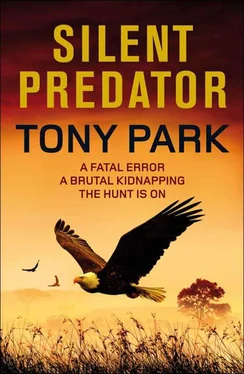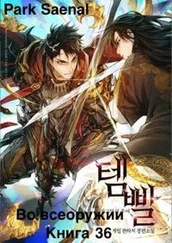Tony Park - Silent Predator
Здесь есть возможность читать онлайн «Tony Park - Silent Predator» весь текст электронной книги совершенно бесплатно (целиком полную версию без сокращений). В некоторых случаях можно слушать аудио, скачать через торрент в формате fb2 и присутствует краткое содержание. Жанр: Триллер, на английском языке. Описание произведения, (предисловие) а так же отзывы посетителей доступны на портале библиотеки ЛибКат.
- Название:Silent Predator
- Автор:
- Жанр:
- Год:неизвестен
- ISBN:нет данных
- Рейтинг книги:5 / 5. Голосов: 1
-
Избранное:Добавить в избранное
- Отзывы:
-
Ваша оценка:
- 100
- 1
- 2
- 3
- 4
- 5
Silent Predator: краткое содержание, описание и аннотация
Предлагаем к чтению аннотацию, описание, краткое содержание или предисловие (зависит от того, что написал сам автор книги «Silent Predator»). Если вы не нашли необходимую информацию о книге — напишите в комментариях, мы постараемся отыскать её.
Silent Predator — читать онлайн бесплатно полную книгу (весь текст) целиком
Ниже представлен текст книги, разбитый по страницам. Система сохранения места последней прочитанной страницы, позволяет с удобством читать онлайн бесплатно книгу «Silent Predator», без необходимости каждый раз заново искать на чём Вы остановились. Поставьте закладку, и сможете в любой момент перейти на страницу, на которой закончили чтение.
Интервал:
Закладка:
‘Why not?’ he asked, mildly offended.
‘We’ll be getting out of the vehicle at some point. I’m not having some bloody elephant charge that snow-white target you’re wearing! Stay here, I’ll be back.’
Miffed, Tom turned on the television and watched some people in a soap opera talking Afrikaans. He understood not a word. Then there was another knock on the door.
‘Here,’ Sannie said. ‘Your new best friend Carla said this should fit your “big broad shoulders”. Jissis, but that woman is transparent.’
She walked into the suite while he pulled off his white T-shirt and donned a khaki golfing shirt with a Tinga lion’s-head logo on the left breast. ‘You think there was something going on between her and Nick?’ Tom asked.
Sannie laughed. ‘ Think? I know. I caught her coming out of his suite one night on an advance visit. She’s hot for cops, that girl.’
‘What do you think?’ Tom said, showing off the new shirt.
‘At least we won’t be killed by an elephant. Let’s go.’
Tea, filter coffee and a selection of cakes and homemade biscuits were laid out in the reception area when Sannie and Tom returned. An American family, parents and three children, was busy clearing the spread. At Sannie’s suggestion she and Tom skipped afternoon tea and headed outside to where two Toyota Land Cruisers were parked. Carla introduced them to their guide, whose name was Duncan Nyari. ‘It means buffalo,’ he said. ‘Nyari, that is.’
The vehicles were open on all sides but each had a canvas roof supported by a metal framework. In the back were three rows of tiered seats covered in green rip-stop canvas. Duncan gave them a briefing which came down to a few key rules: don’t stand up, as the movement would alarm any animals they were watching; keep the noise down; and don’t get out of the vehicle unless told to.
‘You are working for Mr Robert Greeves?’ Duncan asked Tom as he and Sannie climbed into the seat immediately behind the driver’s.
‘Yes.’
‘He is a good man. He loves Africa and its animals, and the people too. He has provided some textbooks for my eldest son for his university studies — even though I did not ask him for these. He is a good friend.’
Tom nodded, silently impressed. Greeves had a reputation as a hard arse in politics — some in the media called him ‘Iron Bob’ — so it was interesting to hear he had a human side as well. ‘Will we follow the same route today that you’ll be taking Mr Greeves and Mr Dule during the visit?’
Duncan shrugged. ‘Generally we go where we think the animals are — we get calls on the radio from our vehicles and talk to other guides and people on the road. However, we will stay in the area of our concession for the most part for the ministers’ visit, so you won’t have too much contact with the other park users.’
‘Going where the animals are sounds fine. Unpredictability’s good.’ In Tom’s line of work the most dangerous periods were when people were entering and leaving buildings — homes, offices, even the heavily guarded Houses of Parliament — at set times. The things which couldn’t be changed provided opportunities to potential assassins.
As they drove out of Tinga’s electronic gates Duncan explained that Tinga was one of a number of private concessions within the Kruger National Park. The concessions had been awarded several years earlier as a means of raising revenue for the National Parks Board. The old Jakkalsbessie camp had been partially destroyed by catastrophic floods which hit the park in February 2000 and, rather than rebuild it, the government had decided to lease the site and a parcel of land to a private operator for exclusive game drives. Tinga’s concession encompassed a block between the parallel-running Sabie and Sand rivers — prime game-viewing country with year-round water. The lodge’s vehicles were also free to roam the public roads in the national park, which were open to holiday-makers from South Africa and abroad. However, inside their own concession they were able to drive off road into the bush — something strictly forbidden in the rest of the park.
Sannie produced a map book of the Kruger Park, the pages of which were illustrated with drawings of wild animals, birds and reptiles, and descriptions of their behaviour. Tom followed their progress as they turned onto a sealed road and crossed the Sand River via a single-lane low-level bridge. Duncan pulled into a passing bay to let a car towing a caravan pass. ‘Hippo,’ he said, pointing to their right.
Tom put down the map book and grabbed the camera from his day pack. ‘They say the hippo kills more people than any other animal in Africa, but I don’t believe this,’ Duncan said.
‘What does then?’ Tom asked, switching on the digital camera.
‘Mosquitos,’ Sannie said.
‘True,’ said Duncan. ‘Snakes kill about a hundred and twenty thousand people around the world every year, plenty of them in Africa. Myself, I think the crocodile kills more than the hippo. The deaths take place in the remotest parts of Africa, particularly along the Zambezi River, but you never hear about these on the radio or television. However, when someone gets killed by a hippo, that’s news.’
Tom was disappointed. The hippo had submerged again.
‘Never mind, there’ll be other hippos, I can assure you,’ Sannie said as Duncan pulled back out into the bridge’s main lane.
On the other side of the river they drove up the steep bank, but before reaching the crest Duncan turned right onto a dirt track. By the side of the road was a stone cairn with a sign featuring a red circle with a white bar through it. It said No entry in English, and Geen toegang in Afrikaans.
‘This is the entrance to our concession. No other vehicles can come in here except ours. Once we get to this part of the park your ministers will be safe from prying eyes,’ Duncan smiled.
Tom was glad to leave the sealed road; this felt more like it, more as he’d imagined a drive in the African bush would be. There still was no sign of open savannah or thousands of migrating wildebeest — he knew these images were from Kenya and Tanzania, in any case — but there was a sense of tranquillity mixed with a spookiness about the thick bush on either side of the vehicle. Most of the trees seemed to be studded with thorns. It looked inhospitable in there.
In his early twenties Tom had served in the Territorial Army with the 10th Battalion of the Parachute Regiment for four years. He’d quite enjoyed spending weekends as a part-time soldier in the outdoors, but the freezing, barren hills of Wales and an exercise in the forests of Bavaria had given him few skills that would translate to the African bush.
Duncan slowed the vehicle almost to a crawl and looked down at the dirt.
‘ Ingwe,’ he said, almost to himself.
‘Leopard,’ Sannie translated. ‘How long ago, Duncan?’
‘Not long — maybe an hour or less. There is nothing marking the tracks — no ant footprints, no leaves blown in them. I know this one. He is a big male.’
‘I thought leopards were nocturnal,’ Tom ventured.
‘No,’ Sannie said. ‘They’re active day and night — opportunistic hunters and very adaptable. Here in Kruger some of them have become quite used to the presence of vehicles and actually use them to help them hunt. They use the noise of the engines to cover the sound of their movements as they stalk impala.’
‘You seem to know your stuff.’
‘Duncan’s the real expert. He’s probably forgotten more than I’ll ever know.’
‘I like guiding for people who know the bush,’ Duncan said modestly. ‘It makes me work harder. This leopard is following the river now, keeping to cover. We might come across him later.’
Читать дальшеИнтервал:
Закладка:
Похожие книги на «Silent Predator»
Представляем Вашему вниманию похожие книги на «Silent Predator» списком для выбора. Мы отобрали схожую по названию и смыслу литературу в надежде предоставить читателям больше вариантов отыскать новые, интересные, ещё непрочитанные произведения.
Обсуждение, отзывы о книге «Silent Predator» и просто собственные мнения читателей. Оставьте ваши комментарии, напишите, что Вы думаете о произведении, его смысле или главных героях. Укажите что конкретно понравилось, а что нет, и почему Вы так считаете.












